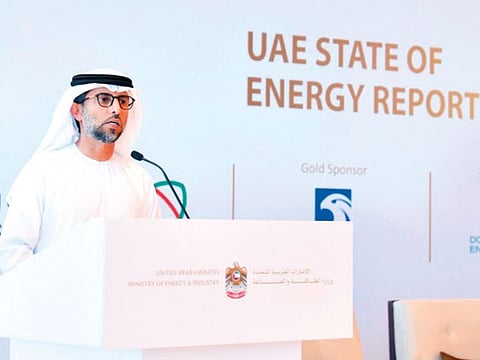UAE stresses output cut extension ahead of Opec meet
Opec and its allies set to meet in Vienna on July 1 and 2

Abu Dhabi: The UAE has stressed on the need to extend production cut agreement ahead of a crucial meeting of Opec (Organisation of the Petroleum Exporting Countries) and its allies in Vienna on July 1 and 2.
“Our view in the UAE is extension is needed, and the reason is we have seen build-up in inventories, especially in the United States, and that would require an extension,” Suhail Mohammad Faraj Al Mazroui, Energy and Industry Minister, on Wednesday said.
“I don’t think it is difficult to come to that conclusion from anyone who is watching the market, so I am not expecting a very difficult process in approving the extension.”
Vienna meeting
The comments come as Opec and its allies, including Russia, are set to meet in Vienna on July 1 and July 2 to take a decision on prolonging output cuts.
The meeting was earlier scheduled to held in the last week of June but was postponed on the insistence of Russia that the meeting be held in July.
Opec and its allies, including Russia, are currently cutting production by 1.2 million barrels per day since January 1, 2019, for six months to bring down global oil stockpiles and rebalance oil markets in terms of supply and demand.
But increase in oil production from the United States as well as other non-Opec countries has led to rise in global inventories pressuring Opec and its allies to consider extending the production cut agreement for the rest of the year.
Oil demand also slowed down due to trade tensions between the US and China.
Trade tensions
“The trade tension between the United States and China have a key role to play in driving demand to different levels. And we hope that the recent information on the talk between the two presidents during the G20 would resolve this fear from the market.”
When asked about the recent attacks on oil installations and how concerned is Opec, he said there are different risk premiums but the group is mostly focusing on how to balance the market in terms of demand and supply.
Tensions in the region have been rising since US President Donald Trump withdrew from a nuclear deal with Iran and reimposed sanctions, and terminated sanction waivers granted to eight countries that import oil from the Islamic Republic.
Following the decision, two Saudi oil tankers as well as oil installations were attacked off the coast of Fujairah last month and on June 13, two oil tankers came under attack in the Gulf of Oman near the Strait of Hormuz, an important route for ships carrying oil from the region to different destinations.
Oil prices rose following the incidents but continue to trade lower on demand concerns as China and the US fight over the issue of tariffs.
Brent was down by 0.60 per cent at $61.75 per barrel on Wednesday at 3:54pm.
Sign up for the Daily Briefing
Get the latest news and updates straight to your inbox



